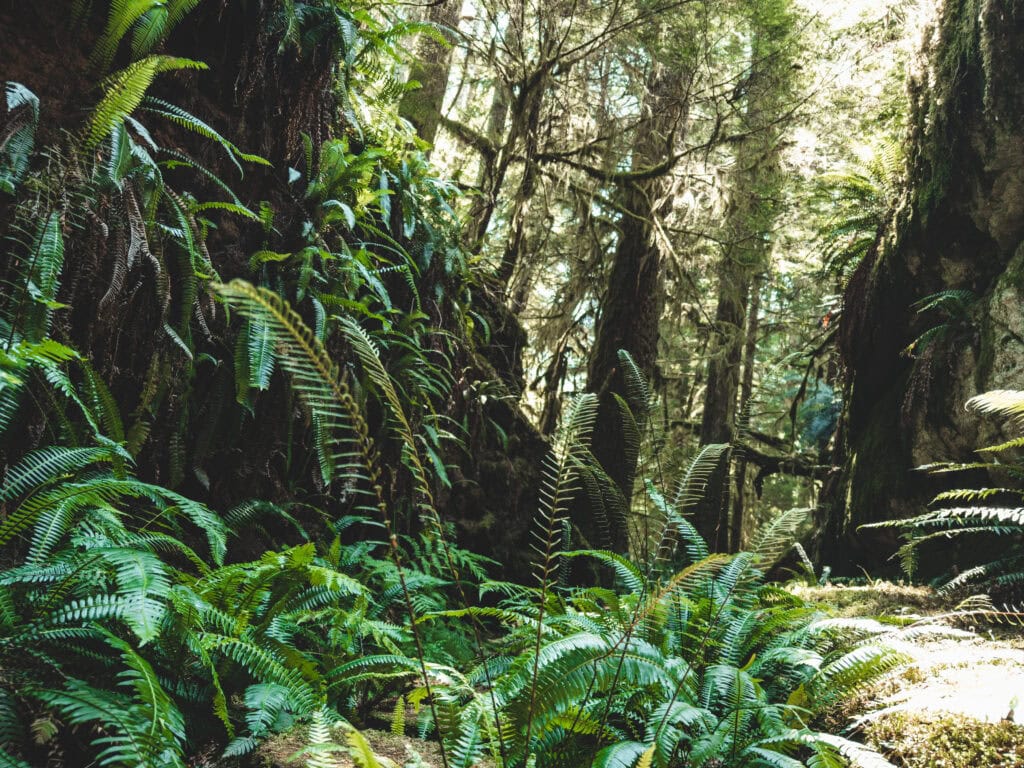Since 2018, Campbell River Whale Watching (CRWW) has partnered with Wilderness International, a non-profit organization dedicated to the legal protection of endangered wilderness. With their help we've been able to fully offset our carbon footprint, making us a carbon neutral company.
Wilderness International is dedicated to the long-term protection of temperate rainforests, focusing its efforts on two of the most ecologically vital and threatened regions on Earth: Canada’s temperate rainforest and the Peruvian Amazon. This Canadian-German-Peruvian organization aims to protect 2.8 per cent of the planet’s remaining intact land habitats by 2050.
Through Wilderness International, we have protected over 74,838 square meters of forest since our partnership began.
What are our goals?
At CRWW, we always have sustainability in mind. We are aware that every tour we run leaves an impact not just on the guests who join us, but on the ecosystems we’re committed to preserving as well.
This mindset has led us to making critical changes to our operations. A few of these entail:

Implementing zero waste practices: We use reusable and compostable packaging in our provided lunches and snacks for our tours. As well as performing bi-annual waste audits, to ensure materials are sorted properly. We also minimize our paper use in daily operations, by utilizing digital waivers for guests.
Tracking our practices: Throughout the year our staff maintain detailed tracking of our resource usage. We record the food production of guest lunches, fuel usage for all of our tours, and our office energy use. We also thoughtfully plan our tour routes to reduce emissions.
Our team is always looking for new ways to improve, often organizing sustainability contests - like biking to work, and regularly brainstorming new eco-friendly initiatives.
But we still cannot dodge our biggest emission source - boat fuel. The technology currently available for electric boats isn’t suitable for the rough tidal waters around Campbell River, meaning we still use petroleum powered boats, which produce carbon emissions.
Our sustainability goal is to reduce emissions wherever possible. But where we can’t reduce, we offset. We choose to offset our emissions through Wilderness International. Just 1.50 CAD, protects one square meter of forest forever.
We purchase one square meter of forest per guest, in order to counteract the fuel emissions of each tour. Guests are given a link to track exactly which plot of land their donation has gone to preserve. And for every guest booking their tour online, we encourage optional additional donations to Wilderness International, that protect four square meters of forest.
Where do our donations go?
In Canada, Wilderness International has completed one conservation project, preserving a piece of land in the Toba Valley. CRWW contributed to this project over the last several years. The Toba Valley is also one of the two locations we take guests for our Grizzly Bear Tours. Timed during the Salmon run, we observe Grizzlies feeding in both the Toba and Bute Inlets.
Our current donation project is preserving land on Porcher Island. The Misty Forest, located about 40 km south of Prince Rupert, is a temperate coastal rainforest home to wildlife such as Otters, Coastal Wolves, and Bald Eagles - to name a few. As well as Douglas Fir’s, Hemlock Fir’s, and Yellow Cedars,
Why protect temperate rainforests?

Temperate rainforests are a unique ecosystem. Their year-round temperatures of 10 to 20°C, combined with high rainfall, create ideal conditions for diverse plant and animal life, resulting in species-rich ecosystems and vital habitats. Due to the climate, and low human interference, they are also home to a variety of huge, ancient trees, such as Western Red Cedar, Sitka Spruce, and Douglas Fir.
Protecting this biodiverse, and rich environment is crucial for sustainability and planet protection.
And the good news?
The good news is that you can help protect Porcher Island. By making a donation to offset your carbon footprint, whether from an upcoming trip or everyday travel, you’re contributing to real climate action.
Featured image provided by Wildnerness International.



